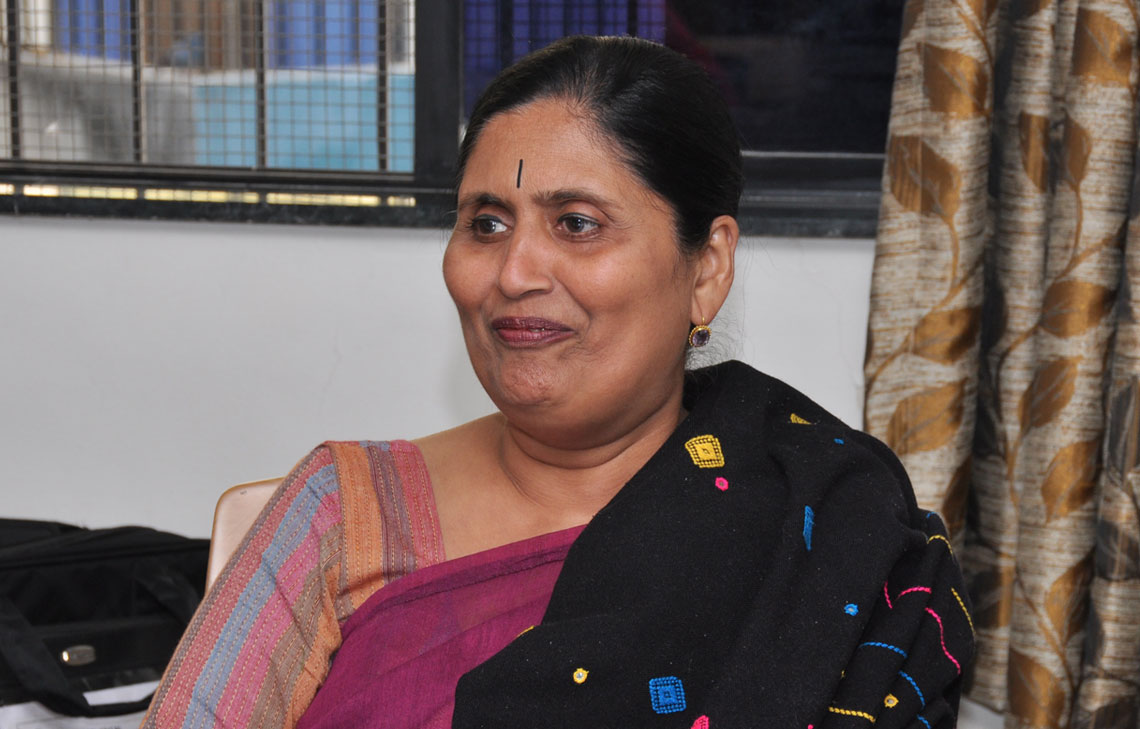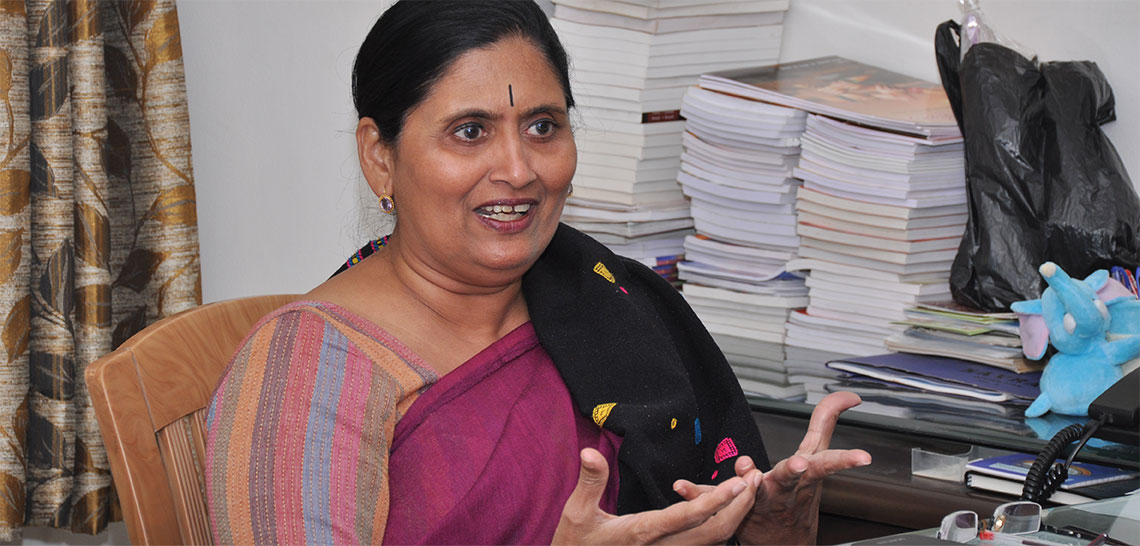Medha Purao Samant: A Financial Inclusion
Luminary in India

Dr. Medha Purao Samant is a financial inclusion luminary. She has garnered many accolades, including the Entrepreneurs International Award, the Women Leaders in Microfinance Award by the Indian School of Microfinance for Women, and the Microfinance India Award by Access Assist in the category of Community Owned Microfinance Organization of the Year 2014. But for her customers and her employees, she will always be their “Medha Tai” (elder sister).
Born to a family of social activists, Medha Tai was drawn to the cause of “banking for the poor.” After 12 years in commercial banking, she decided to devote her life to financial inclusion. She, along with nine women who were her first customers, created Annapurna Pariwar. Today Annapurna is a group of five nonprofit nongovernmental (NGO) organizations working in the urban slums of Mumbai and Pune to empower women.
What was your inspiration for starting Annapurna?
Medha: You know, inspiration is not a one-day thing. It does not happen suddenly. It is a long process. It depends on how you are brought up and how your thought process is shaped along the way. You develop a liking for something. You think about it day in and day out. It becomes your passion. Money becomes not important. You also need a comfort level that this would be something you plan to do for the rest of your life. It was the same that happened with me.
I come from a family with a strong social orientation; both my parents are social activists. My husband too is from a social background. So I always had a very supportive environment around me. Most of our discussions at home were around these subjects. That was one of the factors. Also, I was working for a commercial bank for 12 years and that was leading to frustration. It was a very rewarding job. It paid me well and I was entitled to many other benefits. But I always felt that we were not reaching out to the poor. Our customers were well-educated, elite people who could walk in and dictate their terms. The vegetable vendor just across the street was still borrowing from the money lender. Everyone could see that. I, too, saw it, but I also understood their reality of life and tried to help them. That was the only difference.
You quit a lucrative career at the bank to pursue a social cause. Why?
Medha: The thought of ‘banking for the poor’ was always brewing in my heart. I had also discussed with my family about my decision to quit the banking job and devote the whole of my life to the poor. Microfinance was nowhere to be seen at that time—23 or 25 years ago. For me, it was never a sudden decision. It started as just a trial to test group loan solidarity amongst these women. We initially started with a group of 10. One dropped right at the start, so we had to suffer an initial setback. But luckily the rest of them continued and took responsibility for each other. After a set period of 50 days, we were confident of each other. I was confident enough that this model would succeed.

People challenged your thinking at every step. What was your source of confidence?
Medha: One thing that helped me a lot along the way was that I read and researched a lot. I read about the RBI (Reserve Bank of India) guidelines, about cooperative laws, about the non-banking financial company (NBFC) structure, etc. I learned from my father to study all the pros and cons of any decision before jumping into it. My mother has the heart of an activist; she first listens to her heart and then her mind. I think I have got the qualities from both my parents. Some of my decisions look very quick, but I have deeply studied and researched well. I also consulted some very senior bankers from the field.
As a leader you don’t think what the current trend is, you think about what would be the best for all. As time progresses, the world realizes the impact of the decision and appreciates why that decision was important at that point of time. Whenever I have taken a call of my heart I have backed it up with thorough research and study. Thankfully, all the trustees, board members showed enough trust in me and allowed me to go ahead with whatever I thought was correct.
Tell us the story of the magic money.
Medha: There were nine women who first borrowed from me. I explained to them: ‘This is our money, you have to preserve it. It is our capital.’ For me, those words were magical. When you say it is mine, people do not have ownership. When you say it is ours, anybody and everybody would protect it. From then on, every time they included a new borrower or member, they would explain to the new member everything, things like you cannot skip installment, this is our money, and if you don’t pay we will sit in front of your house. It was simple arithmetic. For them the money was magical, for me it was the thought which was magical.
“The thought of ‘banking for the poor’ was always brewing in my heart.”
Ninety-nine percent of the employees in your organization are women. Some of them have been associated with the organization for as many as 20 years. How do you manage to inspire them and keep them so motivated?
Medha: I feel that there is a slight difference between a women-led organization and a male- led organization. I consider Ela Bhatt, founder of SEWA (Self Employed Women’s Association), as my role model. In a woman-led organization you create an environment and culture for women. It is professional, it is promising; still, it is not so demanding that their personal life takes a back seat. There are two roles every woman has to play, one personal and the other professional. I think I have created a conducive environment at Annapurna. We want to have a professional life with a heart for the poor.
Transparency is a value that you have clearly communicated as important for an orga- nization or business model. What are the others?
Medha: Democracy is at the core of everything. At Annapurna, everyone has a vote; no one can hold a share worth more than 10,000 rupees. Voting opportunity remains the same for anybody. I was brought up in a democratic atmosphere, and I feel that given a choice every human being will make a wise decision. If you have democratic principles in your heart, you know that everyone is equal and everyone is entitled to the same respect. Those values are at the very core of Annapurna. Everyone is well respected and no one, irrespective of their designation or experience, is looked down upon. There is openness in accepting each other’s decisions. For example, at Annapurna, there are benchmarks set for each loan officer, but they decide their own targets. These targets are always evolving, so ownership also becomes an important value.
Annapurna Pariwar has a holistic approach, catering to the needs of women at the low- est strata of the society with microfinance, day-care centers, health insurance, savings, working-women hostels and education scholarships. Are there any future plans?
Medha: Practically speaking, I have no plans for the future. I do not know what need could arise for our clients in the future. I only know that I have created a conducive environment where we listen to our customers when they express something. We created channels of communication from top to bottom. We harness the culture of listening. We listen very carefully. Even when they (customers) are not saying anything, they are saying something. Our data and figures also tell us if there is a particular program that members are not appreciating or moving away from. I don’t know what my members will say tomorrow. If it is doable and we have enough resources, we will do it.
Further Reading:
A Tedx Talk by Dr. Medha Purao entitled “Story of Annapurna Pariwar: Microfinance to Empowerment”
The business statistics for Annapurna’s microfinance unit
